Welcome to our comprehensive guide on the numerous uses of plantains! Whether you’re looking to add more variety to your diet or explore natural remedies, plantains have got you covered. These starchy fruits, similar to bananas, are packed with medicinal properties and offer a plethora of health benefits.
From the leaf to the fruit itself, every part of the plantain offers unique advantages. In this article, we will delve into the various ways you can incorporate plantains into your life to improve your well-being.
First and foremost, let’s talk about the exceptional health benefits plantains bring to the table. Plantains are not only a good source of fiber, vitamins A, C, B-6, and minerals like magnesium and potassium, but they are also known for their versatility in the culinary world.
Whether you’re seeking to enhance your digestive health, heal wounds, strengthen respiratory function, or improve your skincare routine, plantains have a place in your life. We will explore these uses in-depth, so you can fully understand the potential benefits they offer.
So, let’s dive in and uncover the incredible uses of plantains, from herbal remedies to culinary creations!
Nutrient Content and Health Benefits of Plantains
Plantains are not only delicious but also packed with essential nutrients that can contribute to your overall health. These versatile fruits have been a staple food for centuries, offering a wide array of health benefits.
Let’s take a closer look at the nutrient content of plantains:
| Nutrient | Amount per Cup (Baked Yellow Plantains) |
|---|---|
| Calories | 215 |
| Protein | 2 grams |
| Carbohydrates | 58 grams |
| Fiber | 3 grams |
| Potassium | 716 milligrams |
| Vitamin C | 35% of the Recommended Daily Intake (RDI) |
| Vitamin A | 19% of the RDI |
| Vitamin B-6 | 25% of the RDI |
| Magnesium | 16% of the RDI |
As you can see, plantains are a rich source of complex carbohydrates, providing a sustained release of energy. They also contain significant amounts of potassium, which plays a crucial role in maintaining heart health and regulating blood pressure. Additionally, plantains are packed with essential vitamins such as vitamin C, vitamin A, and vitamin B-6, as well as magnesium, which supports various bodily functions.
Now, let’s explore the health benefits of including plantains in your diet:
- Digestive Health: Plantains are high in fiber, promoting healthy digestion and preventing constipation. The fiber content adds bulk to the stool, facilitating regular bowel movements.
- Weight Management: The fiber and complex carbohydrates in plantains provide a feeling of fullness, helping to control cravings and manage weight.
- Antioxidant Boost: Plantains are rich in antioxidants, which help protect the body against harmful free radicals and support a healthy immune system. These antioxidants may also have anti-cancer properties.
- Heart Health: The potassium and fiber content in plantains contribute to heart health by maintaining a healthy heart rate, blood pressure, and cholesterol levels.
Incorporating plantains into your diet can be a great way to enhance your nutritional intake and reap the numerous health benefits they offer.
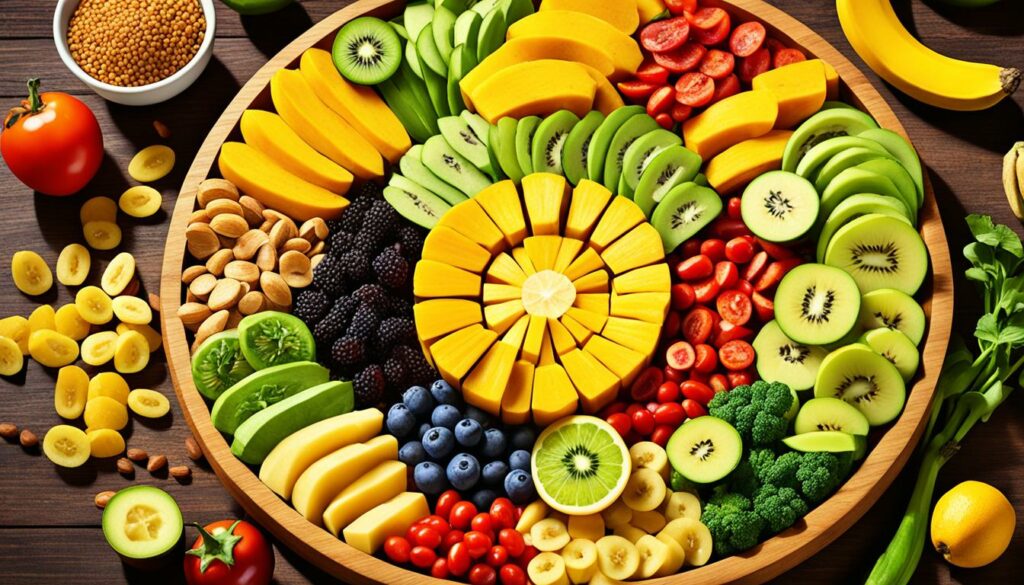
“Plantains are not only delicious but also rich in essential nutrients that support digestive health, weight management, and heart health. Including them in your diet can be a flavorful and nutritious addition.”
References:
- Campos-Vega, R., Vázquez-Flores, A. A., Oomah, B. D., & Loarca-Piña, G. (2010). Common beans and their non-digestible fraction: Cancer inhibitory activity—an overview. Food Research International, 43(3), 589-594.
- Murray, R., & Report, K. N. (2005). The Condensed Encyclopedia of Healing Foods. Simon and Schuster.
- University of California, Davis. (n.d.). Vitamin C and Skin Health. Retrieved from https://lpi.oregonstate.edu/mic/health-disease/skin-health/vitamin-C
Digestive Health Benefits of Plantains
When it comes to promoting a healthy digestive system, plantains can be a valuable addition to your diet. These versatile fruits are packed with fiber, which plays a crucial role in maintaining bowel regularity and preventing constipation. Unlike bananas, plantains have a higher starch content, making them an excellent source of dietary fiber.
A high-fiber diet that includes plantains can help soften the stool and increase its size and weight, making it easier to pass. This can be particularly beneficial for individuals struggling with constipation. By incorporating plantains into your meals, you can naturally relieve discomfort and improve overall digestive health.
Fiber offers several advantages for the digestive system beyond preventing constipation. It slows down digestion, prolonging the feeling of fullness and helping manage cholesterol levels. Additionally, a high-fiber diet can reduce the risk of hemorrhoids and diverticular disease, both of which are linked to poor digestive health.
The Role of Fiber in Digestive Health
Fiber acts as a natural regulator that promotes the movement of waste through the gastrointestinal tract. It adds bulk to the stool, stimulating the muscles of the intestines and facilitating regular bowel movements. Moreover, fiber feeds the beneficial bacteria in the gut, supporting a healthy balance of the microbiome.
Fiber is available in two forms: soluble and insoluble. While insoluble fiber adds bulk and helps prevent constipation, soluble fiber dissolves in water to form a gel-like substance that aids in the digestion and absorption of nutrients. Plantains contain both types of fiber, offering a well-rounded approach to digestive health.
To illustrate the fiber content in plantains, here is a table comparing the fiber content of different varieties:
| Plantain Variety | Fiber Content (per 100g) |
|---|---|
| Ripe Plantain | 1.8g |
| Green Plantain | 2.3g |
| Baked Plantain | 2.4g |
| Fried Plantain | 2.5g |
As you can see, plantains provide a substantial amount of dietary fiber across different varieties, making them an ideal choice for promoting digestive health.
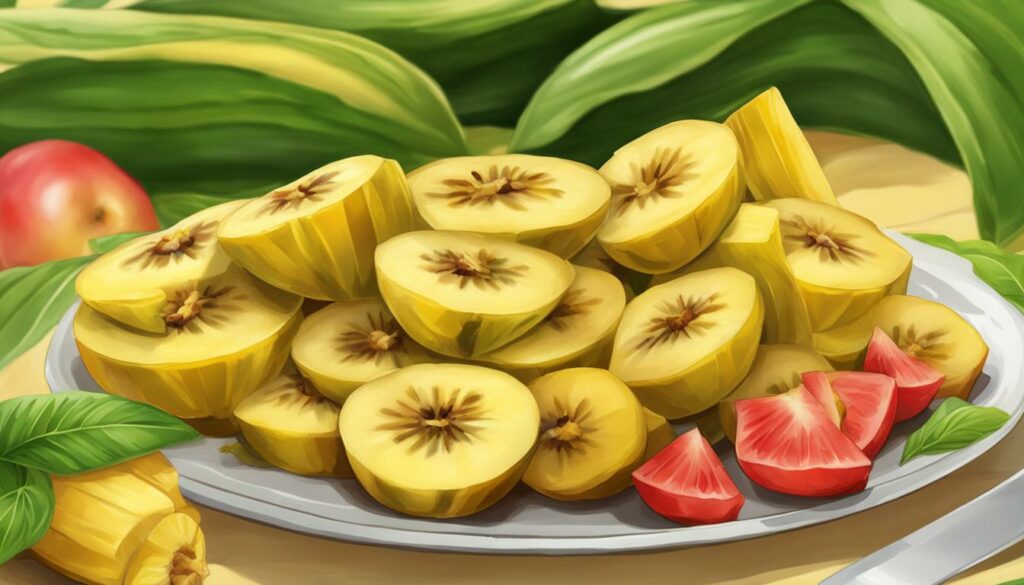
“Including plantains in your diet can support a healthy digestive system.”
By including plantains in your meals, you can increase your fiber intake and support a healthy digestive system. Whether you enjoy ripe, green, baked, or fried plantains, each variety offers its unique nutritional benefits while aiding in bowel regularity. However, it’s essential to moderate your portion sizes to maintain a balanced diet.
Next, we will explore how plantains can contribute to weight management, helping you make informed choices about incorporating this versatile fruit into your diet.
Weight Management and Plantains
Contrary to popular belief, carbohydrates from plantains are not necessarily bad for weight management. The fiber and starch found in plantains are complex carbs that are slowly digested and keep you feeling fuller for longer, reducing the urge to snack on unhealthy foods.
Plantains can be incorporated into a balanced diet and can be a substitute for potatoes or grains in various recipes. They provide a satisfying and nutritious option that can help you maintain a healthy weight. Below is a comparison of the nutritional content of plantains and other common starchy foods:
| Food | Calories (per 100g) | Carbohydrates (g) | Fiber (g) | Potassium (mg) |
|---|---|---|---|---|
| Plantains | 122 | 31 | 2.3 | 499 |
| Potatoes | 77 | 17 | 2.2 | 429 |
| White Rice | 130 | 28 | 0.4 | 35 |
| Whole Wheat Bread | 247 | 49 | 7 | 138 |
As you can see from the table above, plantains have a higher fiber content and provide more potassium compared to white rice and potatoes. This makes them a more satisfying option that can help control hunger and maintain a healthy weight.
Incorporate plantains into your diet by trying out some delicious and healthy plantain recipes. Here are a few ideas to get you started:
- Baked plantain chips: Slice plantains thinly, toss with olive oil and spices, and bake until crispy.
- Plantain tacos: Use sliced plantains as a base for your favorite taco fillings instead of traditional tortillas.
- Plantain smoothie: Blend ripe plantains with almond milk, spinach, and a hint of cinnamon for a nutritious and filling smoothie.
By including plantains in your meals and snacks, you can enjoy their natural sweetness, manage your weight, and reap the nutritional benefits they offer.
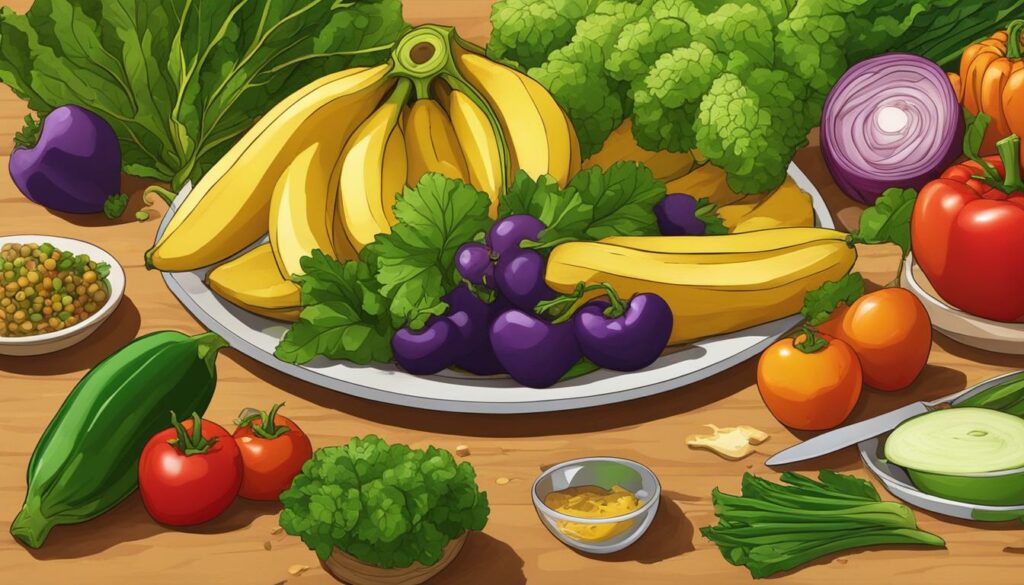
Antioxidant Benefits of Plantains
Plantains are not only a delicious and versatile food, but they also offer several health benefits. One notable benefit is their antioxidant properties, primarily due to their vitamin C content. Vitamin C acts as a powerful antioxidant in the body, helping to protect against free radical damage.
Antioxidants play a crucial role in reducing oxidative stress, which is associated with aging, heart disease, and cancer. These harmful free radicals can damage cells and DNA, leading to various health issues. By consuming foods like plantains that are rich in antioxidants, you can help combat this damage and promote overall health.
Research has shown that a higher intake of vitamin C is associated with a lower risk of certain cancers. In fact, individuals with cancer tend to have lower blood plasma concentrations of vitamin C. By incorporating plantains into your diet, you can increase your intake of this essential vitamin and potentially reduce your risk of developing certain types of cancer.

The Power of Vitamin C
“Vitamin C is an essential nutrient that serves as a powerful antioxidant in the body. It helps protect our cells from damage caused by harmful free radicals and supports overall health and well-being.” – Dr. Sarah Johnson
In addition to its antioxidant properties, vitamin C also plays a crucial role in immune function. It helps strengthen the immune system, allowing it to better fight off infections and illnesses. Vitamin C is also involved in the production of collagen, a protein that is important for the health of our skin, bones, and connective tissues.
Adding plantains to your diet is a tasty way to boost your antioxidant intake and reap the benefits of vitamin C. Whether you enjoy them baked, fried, or as part of a creative recipe, plantains can be a delicious and nutritious addition to your meals.
Plantains for Heart Health
When it comes to promoting heart health, plantains are a fantastic addition to your diet. These versatile fruits are packed with essential nutrients that support a healthy cardiovascular system.
One of the key components of plantains that contribute to heart health is potassium. Potassium plays a crucial role in maintaining a healthy heart rate and blood pressure. It helps regulate the balance of fluids in the body and promotes proper muscle function, including the heart muscle.
In addition to potassium, plantains are also rich in fiber. Fiber is known to help lower cholesterol levels, a major risk factor for heart disease. By including plantains in your diet, you can help keep your cholesterol levels in check and support a healthy heart.
Here is a summary of how plantains benefit heart health:
| Benefits | Explanation |
|---|---|
| Potassium | Helps maintain a healthy heart rate and blood pressure. |
| Fiber | Supports lower cholesterol levels and heart function. |
By incorporating plantains into your balanced diet, you can enjoy the many heart-healthy benefits they provide. Whether you bake them, grill them, or use them in other culinary creations, plantains are a delicious and nutritious way to support your cardiovascular system.
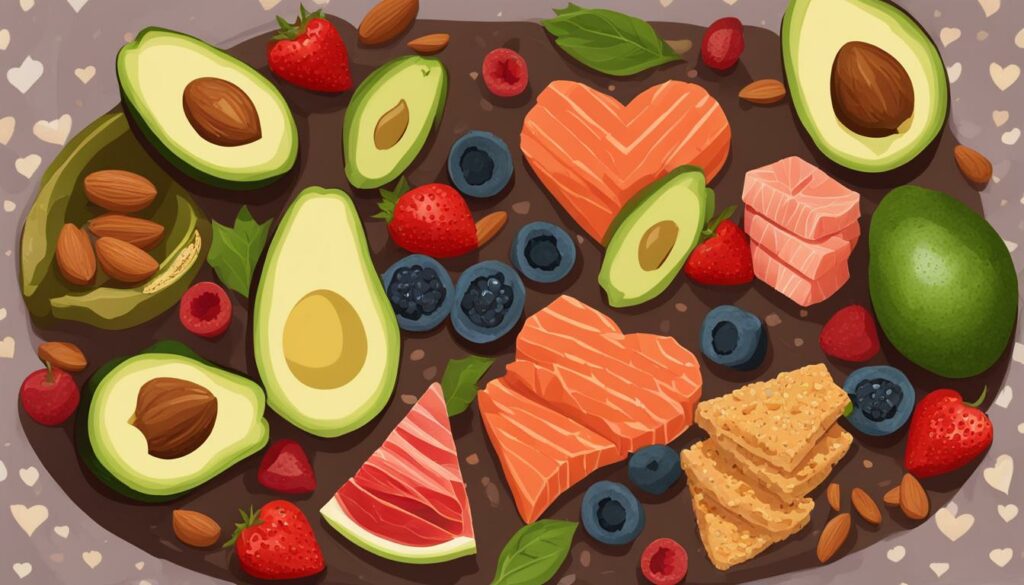
Culinary Uses of Plantains
Plantains are incredibly versatile and can be used in a wide range of culinary dishes and recipes. Whether you prefer savory or sweet flavors, plantains can be adapted to suit your taste and dietary preferences. Here are a few creative ways to incorporate plantains into your cooking:
Baking and Grilling
One popular method of preparing plantains is baking or grilling them. Simply slice the plantains into thin rounds, brush them with a little oil, and bake or grill until they turn golden brown. This method brings out their natural sweetness and creates a crispy texture that pairs well with savory dishes or as a standalone snack.
Frying and Boiling
Frying plantains is a common method used in Caribbean and Latin American cuisine. Known as “tostones” or “patacones,” fried plantains are typically sliced, fried until golden and crispy, and then lightly salted. Boiling plantains is another option, creating a softer texture that works well in soups and stews.
Substituting for Potatoes
Plantains make a great substitute for potatoes in many recipes. Their starchy texture and mild flavor lend themselves well to being mashed or used in casseroles. Try incorporating mashed plantains into shepherd’s pie or using them as a topping for a savory pie.
Gluten-Free and Paleo-Friendly Recipes
If you’re following a gluten-free or paleo diet, plantains can be a fantastic ingredient to work with. They can be used to create delicious gluten-free pancakes or as a base for grain-free flatbreads. You can also combine plantains with other vegetables, like eggplant, to create unique and flavorful dishes.
Sweet Treats
Don’t forget about the sweet side of plantains! Ripe plantains can be used in various desserts, such as plantain fritters or plantain bread. Try caramelizing sliced plantains with a touch of brown sugar and cinnamon for a delightful treat.

As you can see, plantains offer a world of possibilities in the kitchen. Their mild flavor and versatile texture make them a fantastic ingredient in both savory and sweet dishes. So get creative and start exploring the wonderful world of plantain culinary uses and recipes!
Plantains for Skincare
Plantains have soothing properties that make them beneficial for skincare. They can be used topically to alleviate various skin irritations, including insect bites, sunburns, and mild burns. Applying plantain extracts or using skincare products containing plantain can help reduce inflammation and provide a cooling effect on the skin.
One of the traditional uses of plantains is as a natural remedy for insect bites. The anti-inflammatory properties of plantains can help alleviate itching and reduce redness and swelling caused by bug bites. Simply apply a mashed plantain poultice directly onto the affected area for relief.
Plantains can also provide relief for sunburned skin. Their cooling and moisturizing properties can help soothe sun-damaged skin and promote healing. You can create a homemade plantain balm by infusing plantain leaves in a carrier oil, such as olive or coconut oil. Apply the balm to the affected area to help alleviate discomfort and promote skin recovery.
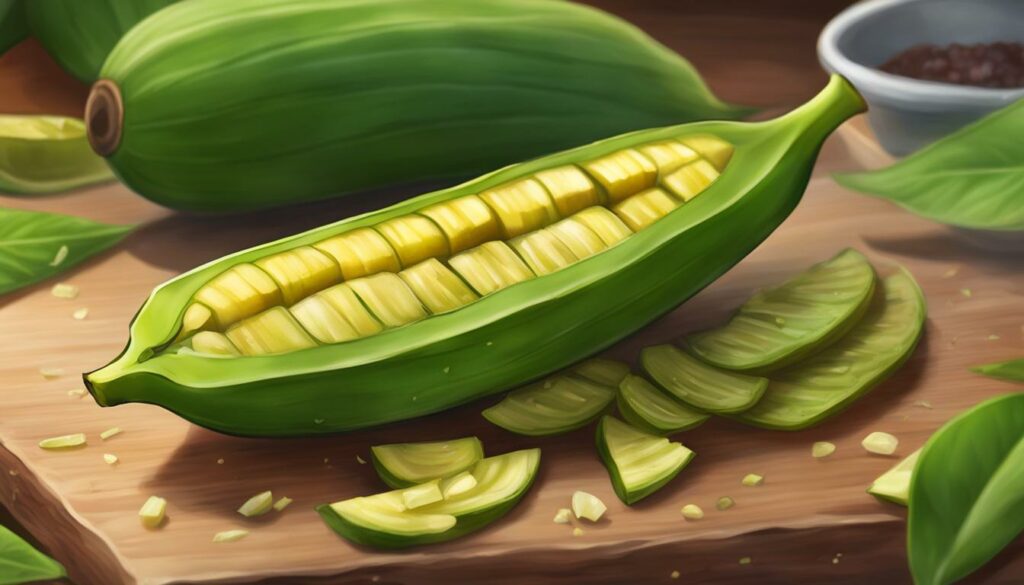
Plantain extracts are commonly used in skincare products for their therapeutic effects. These extracts are known for their anti-inflammatory properties, which can help calm sensitive or irritated skin. Plantain-based products can be effective in treating skin conditions such as eczema, dermatitis, and rashes.
For centuries, plantain leaves have been used as a natural remedy for wound healing. The leaves contain active compounds like aucubin, allantoin, and mucilage, which promote tissue regeneration and reduce discomfort. Chewing plantain leaves and applying them as a poultice on wounds can help expedite the healing process and prevent infection.
Plantain Skincare Tips
- For insect bites: Mash a plantain and apply it directly to the affected area.
- For sunburn: Create a plantain balm by infusing plantain leaves in a carrier oil. Apply to sunburned skin for relief.
- Look for skincare products containing plantain extracts for their soothing and anti-inflammatory benefits.
- Chew plantain leaves and apply as a poultice on wounds to promote healing.
Plantains offer a natural and gentle solution for skincare concerns. Whether you’re dealing with insect bites, sunburns, or wounds, incorporating plantains into your skincare routine can provide soothing relief and promote healthier skin.
Plantains for Wound Healing
When it comes to healing wounds, plantains have been used for centuries due to their incredible medicinal properties. These versatile fruits possess both astringent and antibacterial qualities that aid in the recovery process.
One effective method of utilizing plantains for wound healing is by creating a plantain poultice. To make a poultice, simply crush or chew plantain leaves to release their beneficial compounds. Apply the resulting paste directly to the wound, cut, or scrape. This poultice acts as a natural dressing, facilitating the healing process by keeping the wound clean and protected.
Plantain leaves contain active compounds such as aucubin, allantoin, and mucilage, which promote tissue regeneration and reduce discomfort. The healing properties of plantain poultices have been praised for their ability to facilitate healing, prevent infection, and reduce pain.
To harness the wound healing potential of plantains, follow these simple steps:
- Gently wash fresh plantain leaves to remove any dirt or debris.
- Crush or chew the leaves to create a paste-like consistency.
- Apply the plantain poultice directly onto the wound, ensuring full coverage.
- Secure the poultice in place with a clean bandage or sterile gauze.
- Leave the poultice on for several hours or overnight to allow the natural healing properties to work their magic.
- Remove the poultice and clean the wound before reapplying, if necessary.
Embracing the power of plantains for wound healing not only offers a natural and effective remedy but also promotes the use of sustainable and readily available resources.
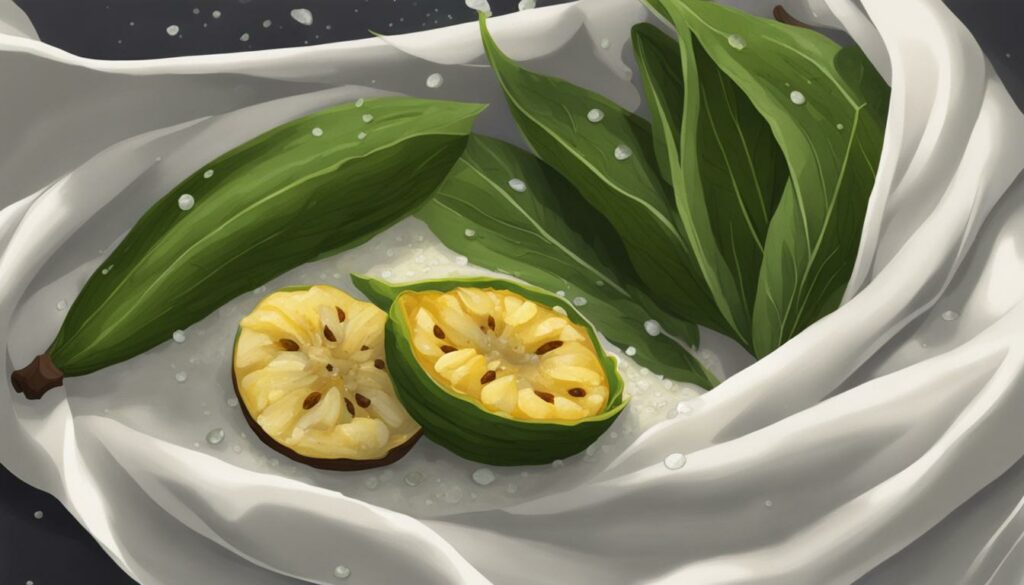
By harnessing the healing capabilities of plantain poultices, you can support your body’s natural healing mechanisms and aid in the recovery of wounds, cuts, and scrapes.
Plantains for Respiratory and Digestive Health
Plantains offer multiple health benefits, including their potential to improve both respiratory and digestive health. These versatile fruits have long been recognized for their natural anti-inflammatory properties, making them effective in alleviating respiratory conditions and asthma symptoms.
When consumed, plantains can help reduce inflammation in the airways, allowing for better respiratory function. This can lead to improved breathing and a reduction in coughing and wheezing. Incorporating plantains into your diet can be particularly beneficial for individuals with respiratory issues.
Furthermore, plantains are also known to promote gut health. Their anti-inflammatory properties extend to the digestive tract, where they act as a natural agent to reduce inflammation and soothe the stomach lining. This can provide relief from digestive discomfort and help maintain a healthy gut.
To further optimize the digestive benefits of plantains, consider enjoying a warm cup of plantain tea. This soothing beverage can help calm the stomach and alleviate symptoms of indigestion, bloating, and other digestive ailments.
Respiratory and Digestive Health Benefits of Plantains
| Health Benefit | Respiratory Health | Digestive Health |
|---|---|---|
| Anti-inflammatory properties | Reduces inflammation in the airways | Acts as an anti-inflammatory agent along the digestive tract |
| Improved respiratory function | Enhances breathing and reduces coughing and wheezing | Promotes a healthy gut and alleviates digestive discomfort |
| Relief from digestive ailments | N/A | Soothes the stomach and aids digestion |
Plantains are a natural remedy for both respiratory and digestive health. Their anti-inflammatory properties make them an excellent choice for those seeking relief from respiratory conditions, such as asthma, as well as digestive discomfort. Enjoying plantains in your diet or as plantain tea can provide a variety of health benefits.
Conclusion
In conclusion, plantains are a versatile and nutritious food that can greatly benefit your health. With their rich content of complex carbohydrates, vitamins, and minerals, plantains offer a wide range of advantages. They are particularly beneficial for digestive health, weight management, heart health, and immune function.
Not only can plantains be used in various culinary dishes and recipes, but they also have excellent skincare properties. From soothing insect bites to healing wounds, plantains provide natural relief and support the healing process.
By incorporating plantains into your diet, you can not only enhance the taste of your meals but also boost your overall health. So why not give this versatile fruit a try? Explore the numerous plantain uses and discover the benefits it can bring to your life.
FAQ
What are the health benefits of plantains?
Plantains have numerous health benefits. They are high in fiber, promote digestive health, aid in weight management, and are rich in antioxidants. They also support heart health, boost the immune system, and offer various vitamins and minerals.
How can plantains support digestive health?
Plantains are high in fiber, which promotes bowel regularity, prevents constipation, and reduces the risk of hemorrhoids and diverticular disease. The fiber in plantains also helps manage cholesterol levels and slows digestion, increasing fullness.
Can plantains aid in weight management?
Yes, plantains can aid in weight management. The fiber and starch in plantains are complex carbs that keep you feeling fuller for longer, reducing the urge to snack on unhealthy foods. They can be incorporated into a balanced diet and substituted for potatoes or grains in various recipes.
Do plantains have antioxidant benefits?
Yes, plantains contain a significant amount of vitamin C, which acts as an antioxidant in the body. Antioxidants help protect against free radical damage, associated with aging, heart disease, and cancer. Higher vitamin C intake has shown an inverse relationship with certain types of cancer.
How can plantains contribute to heart health?
Plantains are beneficial for heart health due to their high potassium content, which helps maintain a healthy heart rate and blood pressure. The fiber in plantains also helps lower cholesterol levels, further supporting heart function.
In what culinary dishes can plantains be used?
Plantains are versatile and can be used in various culinary dishes. They can be baked, grilled, fried, boiled, or substituted for potatoes in stews or alongside fish. Plantains can also be used in gluten-free or paleo-friendly recipes, such as pancakes or mashed plantain and eggplant dishes.
Can plantains be used for skincare?
Yes, plantains have soothing properties that make them beneficial for skincare. They can be used topically to alleviate skin irritations like insect bites, sunburns, and mild burns. Plantain extracts are often included in skincare products for their anti-inflammatory and cooling effects.
How can plantains help with wound healing?
Plantains have been traditionally used for wound healing due to their astringent and antibacterial properties. Applying a poultice made from plantain leaves to wounds, cuts, and scrapes can facilitate healing, prevent infection, and reduce pain. The active compounds like aucubin, allantoin, and mucilage in plantain leaves promote tissue regeneration.
Do plantains have benefits for respiratory and digestive health?
Yes, plantains can be beneficial for respiratory health by reducing inflammation in the airways and improving respiratory function. They can also help alleviate digestive discomfort and soothe the stomach. Plantain tea, in particular, can assist in promoting gut health and alleviating respiratory conditions.

